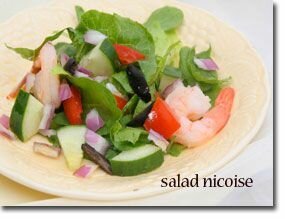Today's Recipe
If you don't know what to serve for dinner tonight ...
This is our easy-to-prepare, health-promoting version of this popular
salad. It is a great salad to make with whatever ingredients you have
on hand.
Salad Nicoise

Prep and Cook Time: 10 minutes
Ingredients:
- 4 cups salad greens
- 3 oz cooked shrimp
- 1 small tomato, diced
- 1/4 cup kalamata olives, sliced
- 2 TBS chopped onions
- 1/2 cup cucumbers, diced
- 1 TBS of your favorite vinaigrette
- optional: chopped anchovies
Directions:
- Combine all ingredients and top with dressing.
Serves 1
Printer Friendly Version of
Salad Nicoise
In-Depth Nutritional Profile for
Salad Nicoise
Healthy Food Tip
Can sea vegetables make important contributions to a diet?
Sea vegetables are a traditional food that has been consumed for
thousands of years. They offer an array of nutrients that are well
suited to promoting health, plus, they are delicious and versatile. When
you incorporate them into your diet you'll see just how they increase
not only the taste of your food but your overall well-being.
History
Eating sea vegetables as part of a healthy diet is nothing new. In
fact, archaeological evidence suggests that Japanese cultures have been
consuming sea vegetables for more than 10,000 years. While very popular
in Asian cuisines, most regions and countries located by waters,
including Scotland, Ireland, Norway, Iceland, New Zealand, the Pacific
Islands, and coastal South American countries have also been consuming
sea vegetables since ancient times.
Types of sea vegetables
There are thousands of types of sea vegetables, each having a unique
shape, taste and texture. Among the many varieties of sea vegetables
that exist a wide range of them are enjoyed as foods. These include:
nori, kelp, hijiki, kombu, wakame, arame and dulse.
A perfect mineral match
Consider the fact that our earth is about 60% water (primarily
oceans) and our bodies are also about 60% water (fluids in and around
our cells, and blood). Then examine the mineral profile of the oceans,
the sea vegetables that grow in these oceans, and our blood. It's
difficult to find any category of food that has as diverse a mineral
composition as sea vegetables. It's also difficult to find any category
of food whose overall mineral composition better matches that of human
blood.
Sources of iodine
Although iodized salt has been the primary source of iodine in many
U.S. meal plans for the past fifty years, excessive use of salt has also
been a problem in the U.S. In many coastal communities around the
world, and particularly in Asia, the primary sources of iodine in meal
plans are sea vegetables. Outside of iodized salt, eggs, milk, and
cheese are the primary sources of iodine in the U.S. diet, and
consequently, individuals who do not consume eggs or cow's milk products
may especially benefit from inclusion of sea vegetables in their meal
plan. A note of caution is important, however, with respect to the
iodine content of sea vegetables. The iodine content of sea vegetables
can vary greatly—as much as 10-fold depending upon ocean conditions.
Rather than simply counting on sea vegetables to provide you with the
iodine you need, we encourage you to develop a more reliable overall
plan together with your healthcare provider as a means to ensure you are
getting the
optimal amount of iodine you need to meet your individual health
needs.
Unique nutrients in sea vegetables - sulfated polysaccharides
The nutritional uniqueness of sea vegetables also involves a category
of nutrient called sulfated polysaccharides. This category of
carbohydrate-related nutrients, also called fucans, has been studied for
its anti-inflammatory properties, and fucan extracts from brown sea
vegetables have been found to lower inflammatory activities of human
proteins called complement proteins.
What you'll sea in the future
When it comes to sea vegetables, you can expect the evidence of their
unique benefits to increase consistently over the next decade. The
reason for this prediction? Scientists are just beginning to agree that
sea vegetables aren't actually plants, but rather, algae. Algae are
themselves fascinating to scientists, because they lie somewhere in
between the world of plants and the world of animals. As scientists
learn more and more about the unique biological category into which sea
vegetables belong, more and more evidence about their nutritional
uniqueness is a virtual guarantee.




No comments:
Post a Comment